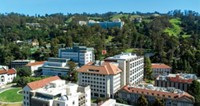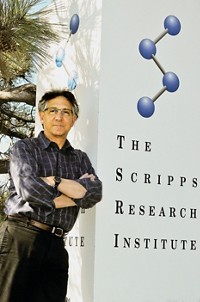Advertisement
Grab your lab coat. Let's get started
Welcome!
Welcome!
Create an account below to get 6 C&EN articles per month, receive newsletters and more - all free.
It seems this is your first time logging in online. Please enter the following information to continue.
As an ACS member you automatically get access to this site. All we need is few more details to create your reading experience.
Not you? Sign in with a different account.
Not you? Sign in with a different account.
ERROR 1
ERROR 1
ERROR 2
ERROR 2
ERROR 2
ERROR 2
ERROR 2
Password and Confirm password must match.
If you have an ACS member number, please enter it here so we can link this account to your membership. (optional)
ERROR 2
ACS values your privacy. By submitting your information, you are gaining access to C&EN and subscribing to our weekly newsletter. We use the information you provide to make your reading experience better, and we will never sell your data to third party members.
Undergraduate Education
Is UC Berkeley’s College of Chemistry in danger?
Undergraduate petitions chancellor not to dissolve chemistry college to fix budget woes
by Celia Henry Arnaud
March 1, 2016
| A version of this story appeared in
Volume 94, Issue 10
CORRECTION: On March 18, 2016, the timeline in this story was updated to correct Gilbert N. Lewis’s identity. He was a physical chemist by training, not an organic chemist.
With rumors circulating on campus that the University of California, Berkeley, was considering disbanding its College of Chemistry for budgetary reasons, one chemistry undergraduate sprang into action to kill the idea before it gained momentum.

College of chemistry history
Proponents of keeping the college intact point to its many accomplishments.
1868: University of California founded.
1872: UC Berkeley’s College of Chemistry created.
1912: Famed physical chemist Gilbert N. Lewis becomes dean, serves until 1941.
1949: William F. Giauque receives Nobel Prize for his work in thermodynamics.
1951: Glenn T. Seaborg receives Nobel Prize for his work on transuranium elements.
1957: Chemical Engineering established as separate department in College of Chemistry.
1961: Melvin Calvin receives Nobel Prize for his work on carbon dioxide assimilation in plants, the eponymous Calvin Cycle.
1986: Yuan T. Lee receives Nobel Prize for his work on the dynamics of chemical elementary processes.
1997: Gilman Hall named a National Historic Chemical Landmark by the American Chemical Society.
On Feb. 24, Jonathan F. (Jo) Melville posted a petition on change.org calling on Nicholas B. Dirks, the university’s chancellor, to preserve the college. Within 24 hours, more than 1,500 people had signed the petition. After just five days, more than 3,300 people had signed.
But such concerns are premature, says university spokesman Dan Mogulof. The university has made no decisions on the future of the College of Chemistry. The idea to dissolve it is just one of many being considered to address UC Berkeley’s financial woes. On Feb. 10, Dirks announced the launch of a strategic planning process in the wake of reduced state funding and the university’s persistent $150 million budget deficit.
UC Berkeley is “embarking on a comprehensive strategic planning process, the aim of which is to reimagine the fundamental structures and processes of our university,” Dirks wrote in his announcement. “Every aspect of Berkeley’s operations and organizational structure will be under consideration.”
Melville, a senior undergraduate in the College of Chemistry, learned from his research adviser, Jeffrey R. Long, a professor of chemistry and of chemical and biomolecular engineering, that one of the changes being considered was the dissolution of the College of Chemistry, which includes the Department of Chemistry and the Department of Chemical & Biomolecular Engineering. Such a plan could make chemistry a department within the College of Letters & Science and move chemical and biomolecular engineering to the College of Engineering. Changes such as these aren’t necessarily being considered just to save money on administrative staff and infrastructure, Moguluf says. They’re also being considered to make it easier to attract philanthropy and generate other revenue.
“I want to make it clear that I am aware that the dissolution of the College of Chemistry is only under consideration at the current time,” Melville says. “Although the Chancellor’s Office has called this petition ‘premature,’ it is our goal to settle this matter before any sort of commitment is made by the administration.” He wants to “smother the plan in the crib,” so the university will choose other solutions to its financial woes.
Circulating the petition led to an outcry from others within the broader chemistry community. Carolyn R. Bertozzi, a former UC Berkeley professor who is now at Stanford University, posted on Twitter “Good lord, do NOT dissolve @UCBerkeley @UCB_Chemistry” with a link to the petition.
When he signed the petition, Timothy M. Swager, a chemistry professor at Massachusetts Institute of Technology, commented that an “elite network of top departments” sustains U.S. dominance in the chemical sciences. “Degrading the role that UC Berkeley plays in this human resource ecosystem will be detrimental to US Science,” he wrote.
An alumnus, Kristopher McNeill, a professor of environmental chemistry at the Swiss Federal Institute of Technology, Zurich (ETH) who earned his Ph.D. at UC Berkeley, says that such a move would bring the structure of UC Berkeley’s chemistry programs more in alignment with universities around the world. But “part of Berkeley Chemistry’s unique success comes from its unique structure,” he says. “While such a reorganization might benefit the university, it doesn’t seem like there is any way it can be better for Chemistry. The best-case scenario is that it’s no worse.”
UC Berkeley chemistry professors think much would be lost by dissolving the College of Chemistry. Christopher J. Chang, who is a professor of chemistry and of molecular and cell biology, says: “By embracing the synergy between science and engineering and fostering an educational environment emphasizing smaller class sizes and student mentoring within a very large public university, the College of Chemistry is an institution that brings unique value to Berkeley and the greater scientific community. It’s a place I’m proud to call home.”
The California legislature established UC Berkeley’s College of Chemistry in 1872 at the request of university president Daniel C. Gilman. The college’s six buildings were home to 855 undergraduate and 501 graduate students as of the 2014–15 academic year.
Mogulof seeks to reassure the campus community. “What is not under any discussion or any consideration is whether or not Berkeley will continue to conduct world-class research and provide world-class education in chemistry. What is under consideration and review across campus—for everything that we do—is how we do what we do.”
UPDATE: UC Berkeley has decided not to disband the College of Chemistry. Read more here.





Join the conversation
Contact the reporter
Submit a Letter to the Editor for publication
Engage with us on Twitter